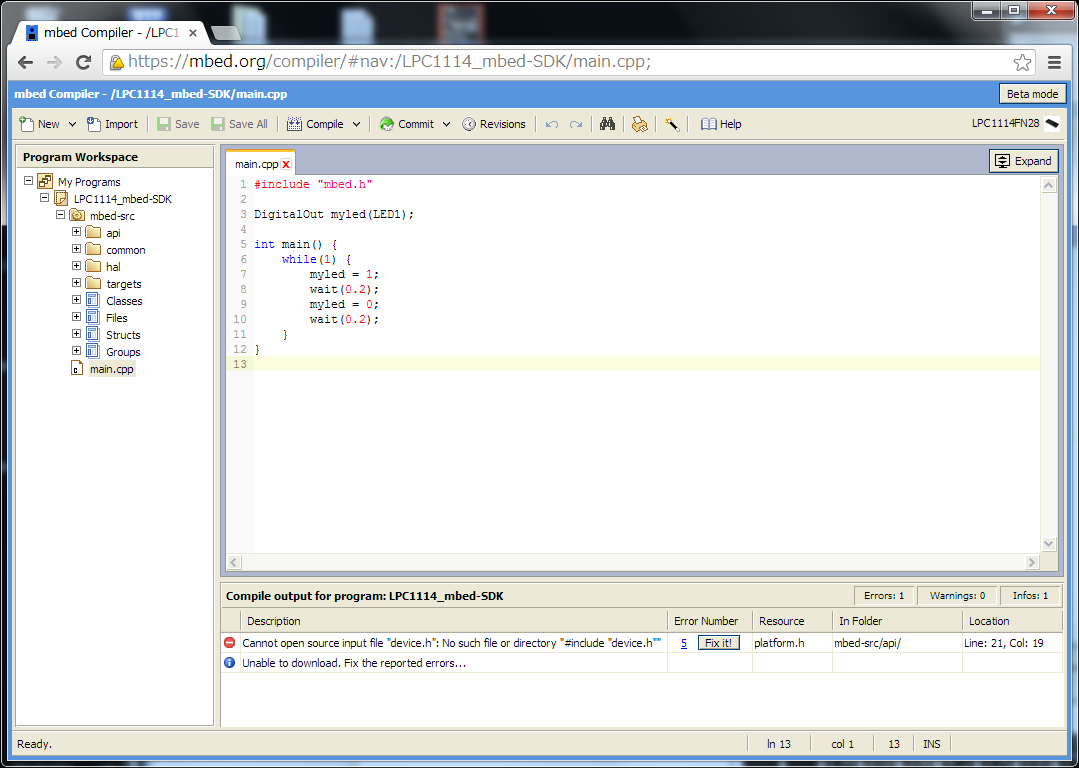Fork of mbed-src file paths change. LPC1114FN28 use only.
Fork of mbed-src by
Information
この情報は2013/10/28時点での解決方法です。
現在はmbed-src、標準ライブラリで問題なくコンパイルが可能です。
・使う物
LPC1114FN28
mbed SDK
LPC1114FN28でmbed-SDKのLibraryを使うとCompile出来ない。(2013/10/28)

パスが通ってないだけのようなのでファイルを以下に移動する。
| mbed-src\targets\cmsis\TARGET_NXP\TARGET_LPC11XX_11CXX\ mbed-src\targets\cmsis\TARGET_NXP\TARGET_LPC11XX_11CXX\TARGET_LPC11XX\ |
にあるファイルをすべて
| mbed-src\targets\cmsis\TARGET_NXP\ |
へ移動
mbed-src\targets\cmsis\TARGET_NXP\TARGET_LPC11XX_11CXX\にある
| TOOLCHAIN_ARM_MICRO |
をフォルダごと
| mbed-src\targets\cmsis\TARGET_NXP\ |
へ移動
| mbed-src\targets\hal\TARGET_NXP\TARGET_LPC11XX_11CXX\ mbed-src\targets\hal\TARGET_NXP\TARGET_LPC11XX_11CXX\TARGET_LPC11XX\ |
にあるファイルをすべて
| mbed-src\targets\hal\TARGET_NXP\ |
へ移動
移動後は以下のような構成になると思います。
※不要なファイルは削除してあります。
 |
ファイルの移動が面倒なので以下に本家からフォークしたライブラリを置いておきます。
Import librarymbed-src-LPC1114FN28
Fork of mbed-src file paths change. LPC1114FN28 use only.
エラーが出力される場合
"TOOLCHAIN_ARM_MICRO"が無いとエラーになる。
| Error: Undefined symbol _initial_sp (referred from entry2.o). Error: Undefined symbol _heap_base (referred from malloc.o). Error: Undefined symbol _heap_limit (referred from malloc.o). |
LPC1114FN28はMicrolibを使ってCompileされるため上記のエラーになるようです。
targets/hal/TARGET_Freescale/TARGET_KL46Z/pwmout_api.c
- Committer:
- mbed_official
- Date:
- 2013-10-07
- Revision:
- 33:e214068ab66c
- Parent:
- 31:42176bc3c368
File content as of revision 33:e214068ab66c:
/* mbed Microcontroller Library
* Copyright (c) 2006-2013 ARM Limited
*
* Licensed under the Apache License, Version 2.0 (the "License");
* you may not use this file except in compliance with the License.
* You may obtain a copy of the License at
*
* http://www.apache.org/licenses/LICENSE-2.0
*
* Unless required by applicable law or agreed to in writing, software
* distributed under the License is distributed on an "AS IS" BASIS,
* WITHOUT WARRANTIES OR CONDITIONS OF ANY KIND, either express or implied.
* See the License for the specific language governing permissions and
* limitations under the License.
*/
#include "pwmout_api.h"
#include "cmsis.h"
#include "pinmap.h"
#include "error.h"
static const PinMap PinMap_PWM[] = {
// LEDs - only RED pin is PWM capable
{LED_RED, PWM_3, 3}, // PTE29, TPM0 CH2
// Arduino digital pinout
{D0, PWM_9 , 3}, // PTA1 , TPM2 CH0
{D1, PWM_10, 3}, // PTA2 , TPM2 CH1
{D2, PWM_4 , 4}, // PTD3 , TPM0 CH3
{D3, PWM_7 , 3}, // PTA12, TPM1 CH0
{D4, PWM_2 , 3}, // PTA4 , TPM0 CH1
{D5, PWM_3 , 3}, // PTA5 , TPM0 CH2
{D6, PWM_5 , 3}, // PTC8 , TPM0 CH4
{D7, PWM_6 , 3}, // PTC9 , TPM0 CH5
{D8, PWM_8 , 3}, // PTA13, TPM1 CH1
{D9, PWM_3 , 4}, // PTD2 , TPM0 CH2
{D10, PWM_5 , 4}, // PTD4 , TPM0 CH4
//PWM on D11 not available
//PWM on D12 not available
{D13, PWM_2 , 4}, // PTD5 , TPM0 CH1,
{PTA0, PWM_6, 3},
{PTA3, PWM_1, 3},
{PTA6, PWM_4, 3},
{PTA7, PWM_5, 3},
{PTB0, PWM_7, 3},
{PTB1, PWM_8, 3},
{PTB2, PWM_9, 3},
{PTB3, PWM_10, 3},
{PTC1, PWM_1, 4},
{PTC2, PWM_2, 4},
{PTC3, PWM_3, 4},
{PTC4, PWM_4, 4},
{PTE20, PWM_7, 3},
{PTE21, PWM_8, 3},
{PTE22, PWM_9, 3},
{PTE23, PWM_10, 3},
{PTE24, PWM_1, 3},
{PTE25, PWM_2, 3},
{PTE26, PWM_6, 3},
{PTE29, PWM_3, 3},
{PTE30, PWM_4, 3},
{PTE31, PWM_5, 3},
{NC , NC , 0}
};
#define PWM_CLOCK_MHZ (0.75) // (48)MHz / 64 = (0.75)MHz
void pwmout_init(pwmout_t* obj, PinName pin) {
// determine the channel
PWMName pwm = (PWMName)pinmap_peripheral(pin, PinMap_PWM);
if (pwm == (PWMName)NC)
error("PwmOut pin mapping failed");
unsigned int port = (unsigned int)pin >> PORT_SHIFT;
unsigned int tpm_n = (pwm >> TPM_SHIFT);
unsigned int ch_n = (pwm & 0xFF);
SIM->SCGC5 |= 1 << (SIM_SCGC5_PORTA_SHIFT + port);
SIM->SCGC6 |= 1 << (SIM_SCGC6_TPM0_SHIFT + tpm_n);
SIM->SOPT2 |= SIM_SOPT2_TPMSRC(1); // Clock source: MCGFLLCLK or MCGPLLCLK
TPM_Type *tpm = (TPM_Type *)(TPM0_BASE + 0x1000 * tpm_n);
tpm->SC = TPM_SC_CMOD(1) | TPM_SC_PS(6); // (48)MHz / 64 = (0.75)MHz
tpm->CONTROLS[ch_n].CnSC = (TPM_CnSC_MSB_MASK | TPM_CnSC_ELSB_MASK); /* No Interrupts; High True pulses on Edge Aligned PWM */
obj->CnV = &tpm->CONTROLS[ch_n].CnV;
obj->MOD = &tpm->MOD;
obj->CNT = &tpm->CNT;
// default to 20ms: standard for servos, and fine for e.g. brightness control
pwmout_period_ms(obj, 20);
pwmout_write (obj, 0);
// Wire pinout
pinmap_pinout(pin, PinMap_PWM);
}
void pwmout_free(pwmout_t* obj) {}
void pwmout_write(pwmout_t* obj, float value) {
if (value < 0.0) {
value = 0.0;
} else if (value > 1.0) {
value = 1.0;
}
*obj->CnV = (uint32_t)((float)(*obj->MOD) * value);
*obj->CNT = 0;
}
float pwmout_read(pwmout_t* obj) {
float v = (float)(*obj->CnV) / (float)(*obj->MOD);
return (v > 1.0) ? (1.0) : (v);
}
void pwmout_period(pwmout_t* obj, float seconds) {
pwmout_period_us(obj, seconds * 1000000.0f);
}
void pwmout_period_ms(pwmout_t* obj, int ms) {
pwmout_period_us(obj, ms * 1000);
}
// Set the PWM period, keeping the duty cycle the same.
void pwmout_period_us(pwmout_t* obj, int us) {
float dc = pwmout_read(obj);
*obj->MOD = PWM_CLOCK_MHZ * us;
pwmout_write(obj, dc);
}
void pwmout_pulsewidth(pwmout_t* obj, float seconds) {
pwmout_pulsewidth_us(obj, seconds * 1000000.0f);
}
void pwmout_pulsewidth_ms(pwmout_t* obj, int ms) {
pwmout_pulsewidth_us(obj, ms * 1000);
}
void pwmout_pulsewidth_us(pwmout_t* obj, int us) {
*obj->CnV = PWM_CLOCK_MHZ * us;
}

